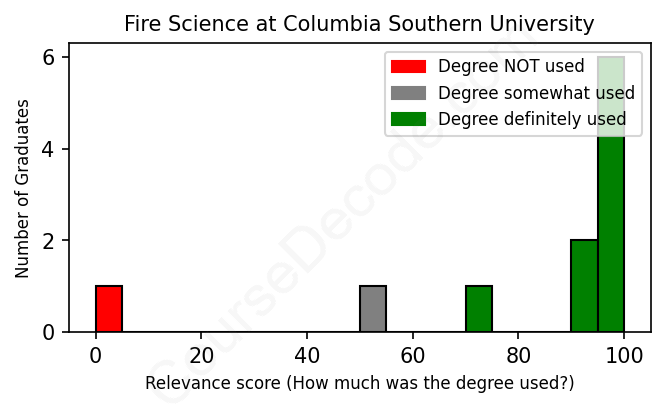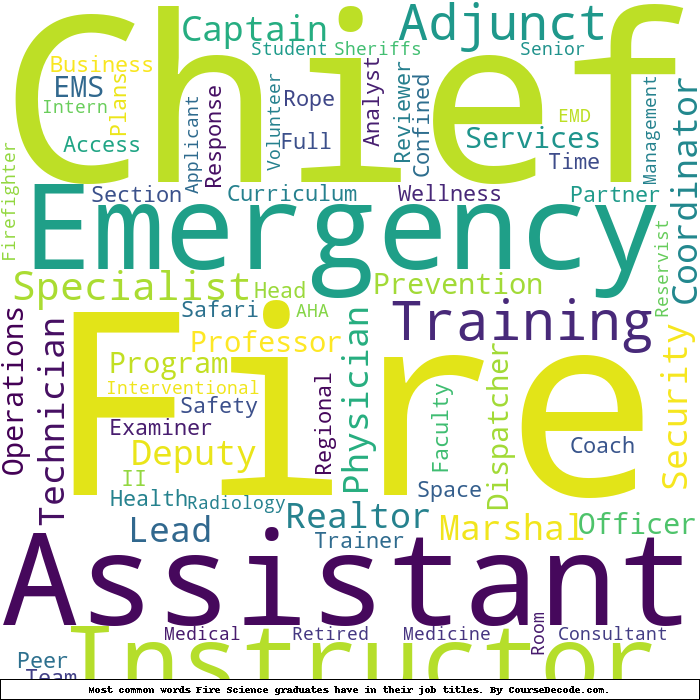
First, some facts. Of the Fire Science graduates from Columbia Southern University we've analyzed , here's how many have used (or NOT used) their degree in their career:

These are estimates based on AI analysis of 11 LinkedIn profiles (see below).
The verdict? Significantly above average. Overall, with an average relevance score of 82%, Fire Science graduates from Columbia Southern University have a much higher likelihood (+15%) of finding work in this field compared to the average graduate across all fields:
And for comparison, here's the chart for all profiles we've looked at across all degrees.
Also, after graduating, 36% of these graduates have pursued further education other than another Bachelor's degree (such as a Masters degree or other), compared to the average across all profiles of 35%. This suggests you may need more than just a Bachelors degree to be competitive as a Fire Science graduate.
See the details:
|
Relevance score: 100% We think this person has gone into a career highly relevant to their degree. We think this person has gone into a career highly relevant to their degree.
DEGREE INFOGraduated in 2013 from Columbia Southern University with a Bachelor of Science in Fire Science. No other secondary education since. JOB HISTORY SINCE GRADUATIONSafety Safari National Hot Rod Association (NHRA) 2016 - Present ABOUTNo information provided. |
The top 10 most common jobs done by the graduates we've analyzed (ranked most common to least) are:
When looking at the job titles of people who studied Fire Science at Columbia Southern University, it’s clear that many have pursued careers directly related to the field. Common roles include Fire Chief, Fire Marshal, and various training and education positions like Fire Training Specialist and Teaching roles in Emergency Services. These jobs typically require a solid understanding of fire science principles, emergency management, and safety protocols, all of which are essential skills covered in their degree program. Notably, these professionals often hold leadership roles, reflecting their advanced knowledge in managing fire-related situations.
However, it’s interesting to see a few outliers. Some graduates have ventured into positions like Business Analyst or Realtor, which don't really connect to fire science at all. While these roles may have provided valuable experience elsewhere, they don't leverage the specialized knowledge that comes from a degree in Fire Science. Overall, despite a few unrelated roles, the majority of these graduates have found ways to engage with fire science in their careers, demonstrating that there are many relevant opportunities available within this field.
Here is a visual representation of the most common words in job titles for Fire Science graduates (this is across all Fire Science graduates we've analyzed, not just those who went to Columbia Southern University):

Graduates from Columbia Southern University's Fire Science program generally start their careers in fire-related roles right after graduation, often stepping into positions like Fire Training Specialist or Assistant Chief of Fire Prevention. Many of them seem to launch on a strong career path within public safety organizations or fire departments. For example, graduates have taken on significant roles, such as Fire Chief and Fire Marshal, not long after their graduation, suggesting that employers see the value in the education and skills these individuals bring to the table.
As time progresses—around 5 to 10 years after graduation—many graduates stabilize in high-ranking positions within the field. You can see examples like graduates moving from training roles to leadership positions and teaching, showing a commitment to both public safety and education in emergency services. However, there's a noticeable trend where not everyone stays strictly within fire science. For instance, some alumni have veered off into unrelated fields, like real estate and health coaching. Overall though, there seems to be a strong thread of successful career progression in fire-related fields for many alumni, making it a solid educational choice for those interested in emergency services.
Honestly, a Bachelor’s degree in Fire Science, including programs like the one at Columbia Southern University, isn't typically seen as one of the hardest degrees out there. It's got its challenges, of course—like learning about fire behavior, safety protocols, and emergency management—but many students find the material relatable and engaging, especially if they have an interest in firefighting or emergency services. Plus, Columbia Southern offers a flexible online format, which can ease the pressure if you need to juggle other responsibilities. So, while you’ll definitely put in some work, it generally feels pretty doable, especially if you stay organized and passionate about the subject!
Most commonly, in the LinkedIn profiles we've looked at, it takes people 2 years to finish a Bachelor degree in Fire Science.
Looking at the career paths of these Fire Science graduates from Columbia Southern University, it seems like many of them have found solid positions within the fire and emergency services field, which typically pays reasonably well, especially for roles like Fire Chief or Fire Marshal. For instance, the ones who climbed to leadership roles, like the Fire Chief in Hillsborough County or the Assistant Fire Marshal in Virginia, are likely making pretty decent salaries. But not everyone is in that high-paying track; some have branched into roles like safety or education, which might not pay as much. Overall, it looks like a mixed bag – while there are definitely some who are likely doing well financially, others might be on the lower end of the salary scale. But in general, jobs in fire science do have potential for good earnings, especially with experience and advancement!
Here is a visual representation of the most common words seen in the "about" section of LinkedIn profiles who have a Bachelor degree in Fire Science (this is across all Fire Science graduates we've analyzed, not just those who went to Columbia Southern University). This may or may not be useful:

Here are all colleges offering a Bachelor degree in Fire Science (ordered by the average relevance score of their Fire Science graduates, best to worst) where we have analyzed at least 10 of their graduates:
| College | Score | Count |
|---|---|---|
 Columbia Southern University Columbia Southern University
|
82 | 11 |